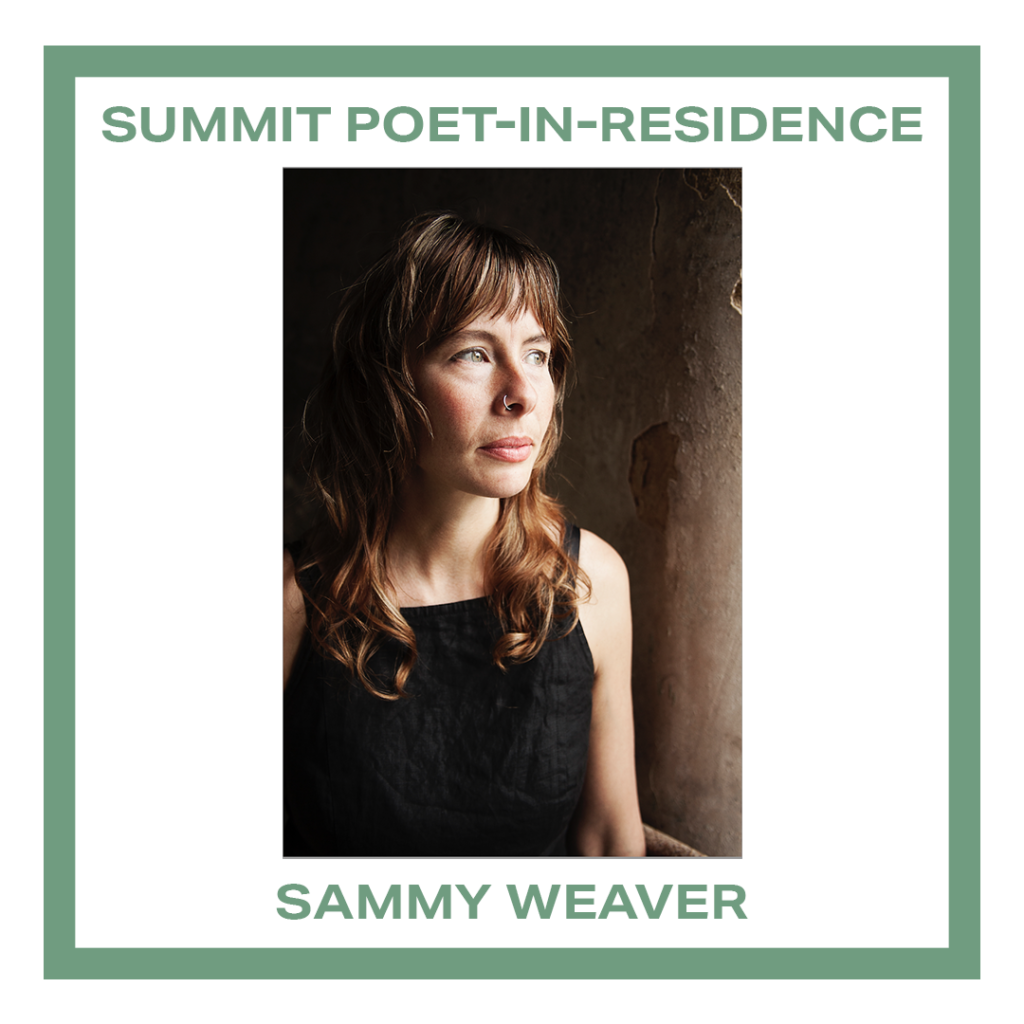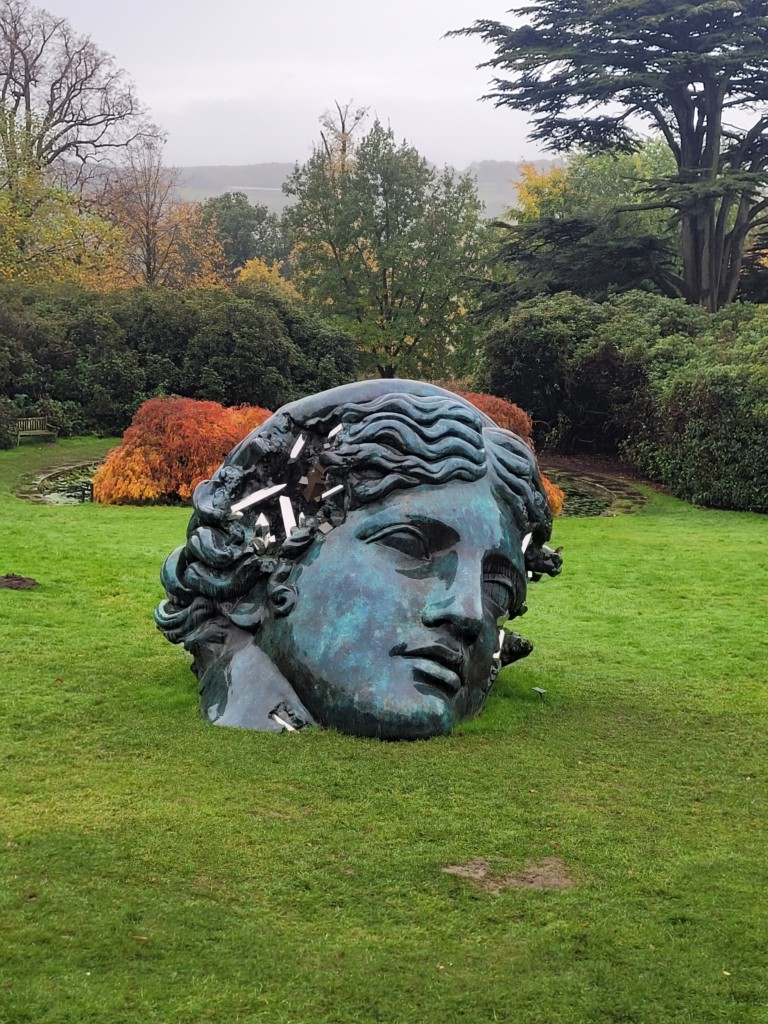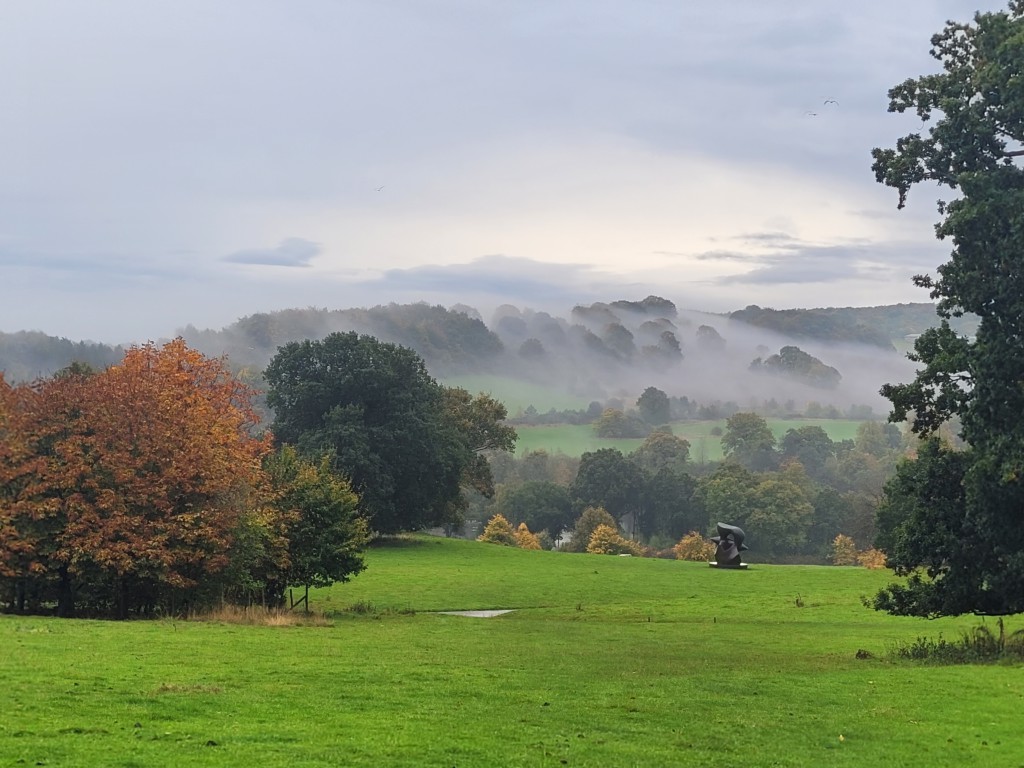To celebrate our launch of the Laurel Prize 2025, we are proud to present a beautiful blog and four stunning new poems from our Summit Poet in Residence, Sammy Weaver. In October 2024, over two hundred people and over twenty leading poets gathered for Summit, our festival devoted to ecopoetry and nature writing, with our partners Yorkshire Sculpture Park and University of Leeds.
Over the two day festival, Sammy attended workshops with Yvonne Reddick, Caleb Parkin, Antony Dunn and Caroline Bird, as well as the Laurel Prize-Giving Ceremony and a gorgeous range of readings and panel discussions. Read on for her reflections and creations….

Melpomene, Yorkshire Sculpture Park
Muse of Tragedy
all that is left of her
is this giant bronze head
half-submerged listing
like a shipwreck at the surface
of the waterlogged lawn
her patina of cyan and ferozah
her cicatrices budding
silver pyrite and the rain’s
incessant chorus
etching her skin
each night she hoists herself
from her soggy bedding
gropes for xanax diazepam
only to look
down at herself again
her gravity-ridden body
still humming her drugged-dumb song
of civilization and carbon
urn of her skull
subsiding into soil
under the thrum
of her delirium
she can just about make out
microscopic eggs
the ticking of ongoingness

Tardigrades
They are the scale of pollen,
bodies swollen as if stuffed
with fluffy down,
puckered stems, spigots.
They barrel through soil,
stubby legs suspended
from bivvy-bag torsos
that concertina in an atmosphere
of green cells, jewells of dew.
Moss-dwellers, slow-steppers,
drifting like spaceships
amongst galaxies of spores —
survivors of extinctions,
of fireterror.
We blast them to outer space,
and still they persist,
ikons of earth-law —
yet despite the myth
are not immortal, nor our saviours.
Leopard Slugs
Limax Maximus
Back late we find you on your nightly raids
gliding through our space like a freight
train, grazing on the fallen odds of our home.
Mottle-robed wizards of the small hours,
you are all tenterhooks for what’s ahead,
true visionaries, your gestures extend beyond
your bunkers to a patience, so what then,
hermaphrodites, do you make of love?
— like sweethearts, you lick and pet with the slack
pouch of your mouths, then climb and climb to the
highest branch, unspool a mucus rope, tumble
down in a pirouette, helixed, balletic —
eddying into a trance, a seance,
swapping the code, the difference.
Fall
Forget the opalesque
rays and orbital
glitter, god really
looks like a gutter,
not the newly-
fitted kind but one
that’s heamorraging
leaf litter, bulging
with sky-mulch
and summer scum
and every now
and then a rat
shimmies down
testing its length —
these are your gods
attached to every
house, unnoticed,
siphoning
the heavens of
rain so the rain
might find
a throat

The day began with scavengers.
a fox’s tail extinguished between the black bins of
Leeds City Centre
The day began with a sparky conversation with poet, Caleb Parkin, about scavengers and more precisely scavenger methodology. Scavenger methodology in the regurgitated words of Sophie Marie Niang is ‘a methodology for worldmaking…triggered by necessity…something to turn to when there are no other choices…seeing value where others might not.’ Scavenger methodology is by and for marginalised subjects who refuse colonial, extractive worldmaking, and instead rummage the world for alternative — queer — ways to know, live and be. We make do with what is to hand.
seagulls arrive in gangs at the altar of
landfill, hopping in delight
In her paper, ‘in defence of what’s there: notes on scavenger methodology’, Sophie Marie Niang is speaking from the discipline of social sciences and its obsession with categorisation and extracting new data — born out of settler-colonial practices. This is a call for re-thinking what matters and who gets to decide what matters.
It matters what matters we use to think other matters with; it matters
what stories we tell to tell other stories with; it matters what knots knot knots,
what thoughts think thoughts, what descriptions describe descriptions, what ties
tie ties. It matters what stories make worlds, what worlds make stories.
― Donna Haraway
Scavenging is risky, open-ended; you never know what you’ll get. Scavenging puts you fully in the world, attuned and alert to the next gobbet on the side of the road. Somehow this conversation with Caleb feels fundamental to our ongoingness as humans; to dwell in the leftovers. I often wonder, if we stopped making new clothes, how many centuries would we last ― warm, fleeced, stilettoed?
everything you need is already here
refrains Sophie Marie Niang
As a narrowboat dweller, I regularly scavenge for deadwood along the towpath and all of a sudden I notice and hear the world around me afresh, tuning into the small existences beyond myself of oak galls and insects. We must tune into life beyond us.
— as for us:
we must uncenter our minds from ourselves;
we must unhumanize our views a little, and become confident
as the rock and ocean that we were made from
— Robinson Jeffers
Squally rain bends and billows as we arrive at Yorkshire Sculpture Park. The trees and sculptures almost erased, undefined like a word yet to be spoken. Midday, the sun hammers through like a blacksmith. I notice winged seeds gyring down, oak leaves still as welded steel, midges drifting between their mid-air rooms. The sprung latch of a crow call. A squirrel pilfering acorns. Scavenging is a practice of wonder and awe. Wonder for the more-than-human and wonder for language oozes through the weekend.
everything you need is already here
‘Why nature poetry?’, asks poet Anthony Dunn, ‘to grasp it’ one workshop attendee replies, ‘to know ourselves’, another adds, ‘to think with…how do we think if not with nature? After all, we are nature’, another responds.
a spider unreels her web below
the windowsill of the workshop room
Imagine you are a creature in this landscape, prompts Anthony.
I am all mouth
all shut-down
around me the earth swells
creaking with root and worm
you can almost taste
the fallen language
of the sun
Poet Yvonne Reddick invites us to imagine the extractive history of an everyday object made of oil. We search the workshop room for inspiration, sharpening our gaze, collecting clues — scavengers.
call it a love song.
i’ll get the bathtub ready.
i’m in. we in ceramic.
let’s say black. i’m bp
you’re shell. we all in.
— Gboyega Odubanjo
In his workshop, Caleb Parkin likens poems to ponds with a life of their own, small worlds of reflection. We contaminate each other’s poems with phrases written on scraps of paper, throw our offerings at each other across the table. Beyond the workshop room, a sign reads ‘DEEP WATER BEWARE DO NOT ENTER’. I peer over the wooden fence clotted with brambles to a green oval of algae tensing and slacking with the pulse of the breeze. The water pinches into the tripod of a pond skater. I want to take off my clothes and enter the scum. This feels like the forgotten belly of the Sculpture Park — overgrown pond messy with weed and nettles, a good place for scavengers. Close by, a sculpture of a giant buddha mosaicked with gold, cobalt and turquoise pebbles, prays. ‘Often writing about nature feels impossible, ungraspable, but somehow the act of trying is what matters’, a workshop attendee throws into the idea-pond. ‘It’s about an ethics of attention’, states Caleb. When we look beyond our looking, what do we find? When we listen beyond our listening, what do we hear?
Perhaps this blog is becoming a bog-like accumulation of voices, peat-like, a layering of stories. Perhaps how we respond to the ecological crisis of mass extinction we find ourselves in is to change the stories we tell ourselves, of how we relate to the more-than-human. Every story, every poem tells us something about the importance (or lack of) we grant the more-than-human, the space we make for the worlds beyond our immediate human-selves.
pond as protagonist!
algae-novella!
scavenger poetics!
We make do with what is to hand. We rejoice in what is at hand and create from the waste. What if I strip off and dip my body in the slurry-poisoned river?
I steep myself in the stained and seedy present
and say I am part of this
— Jean Sprackland
The following day begins with mushrooms. Mushrooms sprouting from the lawn outside the Clothworkers Concert Hall at Leeds University. Conker-brown cortinarius mushrooms fruiting in arcs. Under the fir tree, luminous white mushrooms in huddled troops. The strong winds of Storm Ashley are churning leaves into tight vortexes. The mooring pins holding my narrowboat to the towpath are being ripped out by the tug and pull of the gales. In her workshop, Caroline Bird, states ‘every time you write you start with nothing, you must step out into the sky and knit from the nothingness’. I love this. It condenses the looming edginess of writing. Or perhaps, you must step out into the sky and scavenge.
The afternoon is a series of talks, readings and panel discussions on hydropoetics, place-poetics rooted in earthly landscapes, and toxic states. Rosettes of sunlight blink on the wall of the amphitheatre. Gazing up at an absent god as she reads, Rachael Allen’s incantatory epic, God Complex, splices together abuse against the environment with personal loss and the breakdown of a relationship. Anthony Vahni Capildeo interludes their reading with terrorfacts, ‘there is a plastic island in the Pacific three times the size of France.’ By mid-afternoon, my mind is full of overheard — scavenged — conversations:
how do we express kinship and difference?… how do
we account for the scale of things?…
language is a spell…
language can make change… delight
in the sound of words…
the gaps between things…
how do you make time?… they have evolved to survive
in highly toxic… decentralise the human
At the end of the day, I talk to John Wedgwood Clarke about his obsession with toxic landscapes and the hideous sublime. I ask him,’but how do you visit a landfill?’, he replies, ‘well, they make it as difficult as possible. They have to set off flares to scare the seagulls away, otherwise you get bombed.’ The scavengers, it seems, are reclaiming the skies so that we might reimagine the stories we tell ourselves.
After the festival, I return home to my boat moored next to Pennington Flash. At the start of the 20th Century, a coal mine collapsed and flooded, creating the flash — a vast lake and haven for nightingales, marsh harriers, spoonbills and storm petrels. Around my headtorch, the putter of a wren-sized moth. These must be the scavenged songs to go on with.
Add your Reply
You must be logged in to post a comment.